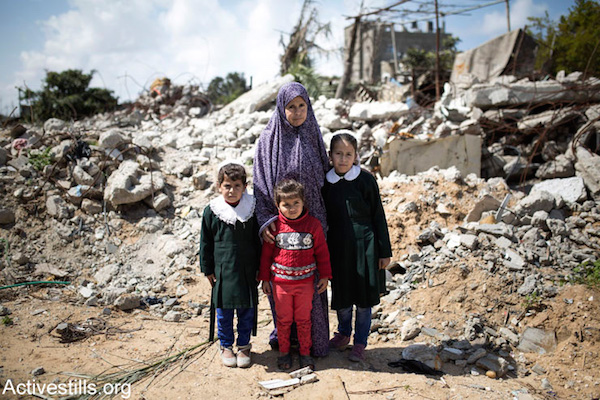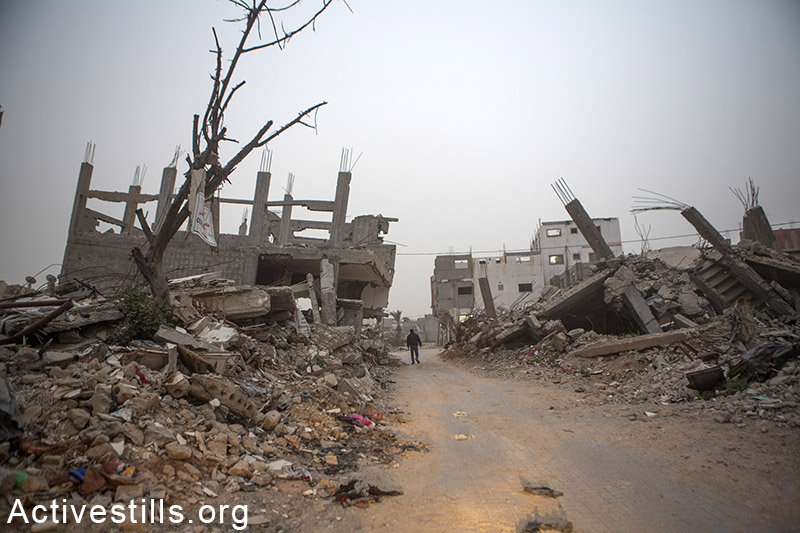A group of young activists in Gaza are organizing an international day of solidarity to protest against the impossible conditions and human rights violations created by Israel’s and Egypt’s siege, the occupation, internal Palestinian conflicts and poverty.
By Yael Marom

“Life in Gaza has always been hard. But after Israel’s last attack it became impossible to live here. The problems became worse and the conditions deteriorated to the point that it is no longer possible to live humanely — and nobody cares,” Sajida Alhaj, 21, says in a Skype interview.
Alhaj is part of a group of young activists in Gaza that last month published a call for a mass protest in the Strip on April 29, demanding an end to the siege, the occupation and the human and civil rights abuses that accompany them.
The activists are calling on anyone who believes in freedom, justice and equality, the world over, to join them and organize parallel protests in their own countries, to express solidarity and to recognize their suffering.
“The situation in Gaza is disastrous,” she says. “We are calling on people to support Gaza by demonstrating in front of the Israeli and Egyptian embassies in every country, and force them to open the borders and break the siege — let building materials in to allow rebuilding, and let sick people out for medical treatment.”
Alhaj is a student and Palestinian refugee who lives in the central Gaza Nusirat Camp. In the past, the activist group she is a part of has mostly worked with women, children and the wounded in Gaza. Now, they are trying to unite the entire Strip.
“This action is our answer to the siege under which we live,” she explains. There are more and more human rights violations each year, and there is no sign that anything is getting better, she adds.
When you walk down the street, she explains, you see one house standing and one house in rubble, one after another, on and on. In order to reach her university every morning, Alhaj says she must “walk between homes damaged in the war, to walk through places where people were killed.”
“And all that to reach my damaged university just to meet with my professors who haven’t been paid for political reasons,” she adds.
The idea behind the protest in Gaza is to get everyone onto the streets, to fill the central squares, with people of all affiliations and ages, decrying the problems from which Gaza suffers: the occupation, the siege, internal conflicts, the lack of electricity, poverty, holdups in rebuilding after the war, unemployment and a deteriorating education system.
The activists say they have gotten the various Palestinian factions on board and received permission from the authorities in Gaza. So far, over 12,000 people have joined their Facebook page.

A group of Israeli women has already answered the call to action and is organizing a solidarity demonstration in Tel Aviv on the same day as the Gaza protest.
“It is important that there is a protest in Israel,” Alhaj says. “It is important that people in Gaza know that there are people in Israel who care about us and who oppose the occupation, who are calling to lift the siege and open the borders.” Such solidarity gives hope, she adds.

Activists from Costa Rica and Chile have also organized similar events. The Palestinian organizers in Gaza are calling on people in the United States and Europe to join them and organize events in additional cities.
Israelis — and people worldwide — are only interested in Gaza when rockets are flying, says Esther Rapoport one of the organizers of the protest in Tel Aviv.
To Rapoport, the young activists and organizers in Gaza are inspiring. “They are not giving up their belief in humanity, including the humanity of Israelis who care about them. They are willing to work in cooperation with us — something that shouldn’t be taken for granted — and to call on us to act. Let’s not disappoint them.”
Yael Marom is Just Vision’s public engagement manager in Israel and a co-editor of Local Call, where this article was originally published in Hebrew.
